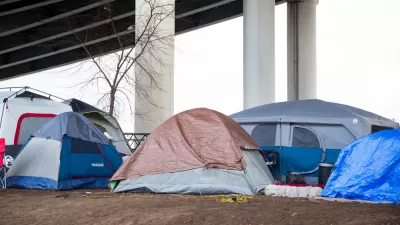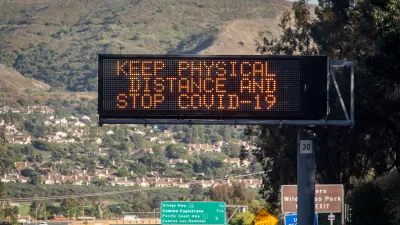Votes exceeded the two-thirds threshold to pass two vital transportation funding measures in San Francisco and Alameda counties. In Berkeley (which passed the nation's first soda tax) and Menlo Park, voters resoundingly reject anti-growth measures.
"The Bay Area’s two transportation tax measures were on track to capture the two-thirds majority needed for approval," writes Michael Cabanatuan, transportation reporter for the San Francisco Chronicle.
San Francisco voters were supporting [71.27 percent to 28.73 percent] Proposition A, a $500 million bond measure to be used for redesigned streets, more bike and transit-only lanes, updated traffic signals, improved maintenance facilities, and new elevators and escalators at Metro stations.
By comparison, we reported today that the state of Rhode Island passed a $35 million bond to fund transportation improvements. In that post, we also noted that San Francisco's "car-first" Measure L was resoundingly defeated.
In Alameda County, "the $7.8 billion Measure BB was closer but appeared headed toward the needed two-thirds approval," writes Cabanatuan. "The 30-year tax measure, nearly identical to one that narrowly failed in 2012, would extend an existing half-cent sales tax and tack on another half cent."
Turning to land use, the two "anti-growth measures adopting pro-growth language to survive" didn't survive in the ballot box—they were trounced on both sides of the Bay.
Berkeleyside reports that Measure R was rejected by 74 percent of voters, and incidentally, Measure D (soda tax) won with 75 percent of the vote—the nation's first such tax to pass. San Francisco's soda tax (Proposition E) received 57 percent, not meeting the two-thirds threshold to pass, reports Huffington Post.
On the peninsula, "Menlo Park voters (gave) Measure M a drubbing," writes Rhea Mahbubani of the San Jose Mercury News on the divisive "initiative that would have tightly restricted downtown office development."
With all 25 precincts reporting, unofficial election results show that 62.3 percent of voters rejected Measure M. (It) was championed by Save Menlo, a grassroots group of residents who fear developers will exploit loopholes in the El Camino Real/Downtown Specific Plan to build huge, traffic generating office towers and ruin the city's "village character." The group collected more than 2,400 petition signatures to qualify the initiative for the Nov. 4 ballot.
Readers may recall a recent post referencing San Diego environmental attorney Marco Gonzalez who wrote that the term, “community character” was code for not only opposing density, but then some:
But I’ll tell you what has been astounding to me. It is that, the “community character” argument is the most powerful sword being thrown up by communities who really don’t want brown people, who really don’t want poor people, who really don’t want to see a development come into their neighborhood because they’ve got theirs, and they don’t care if someone else can’t get the same thing.
FULL STORY: Transportation measures in S.F., Alameda County win support

Alabama: Trump Terminates Settlements for Black Communities Harmed By Raw Sewage
Trump deemed the landmark civil rights agreement “illegal DEI and environmental justice policy.”

Study: Maui’s Plan to Convert Vacation Rentals to Long-Term Housing Could Cause Nearly $1 Billion Economic Loss
The plan would reduce visitor accommodation by 25% resulting in 1,900 jobs lost.

Planetizen Federal Action Tracker
A weekly monitor of how Trump’s orders and actions are impacting planners and planning in America.

Wind Energy on the Rise Despite Federal Policy Reversal
The Trump administration is revoking federal support for renewable energy, but demand for new projects continues unabated.

Passengers Flock to Caltrain After Electrification
The new electric trains are running faster and more reliably, leading to strong ridership growth on the Bay Area rail system.

Texas Churches Rally Behind ‘Yes in God’s Back Yard’ Legislation
Religious leaders want the state to reduce zoning regulations to streamline leasing church-owned land to housing developers.
Urban Design for Planners 1: Software Tools
This six-course series explores essential urban design concepts using open source software and equips planners with the tools they need to participate fully in the urban design process.
Planning for Universal Design
Learn the tools for implementing Universal Design in planning regulations.
Caltrans
Smith Gee Studio
Institute for Housing and Urban Development Studies (IHS)
City of Grandview
Harvard GSD Executive Education
Toledo-Lucas County Plan Commissions
Salt Lake City
NYU Wagner Graduate School of Public Service





























